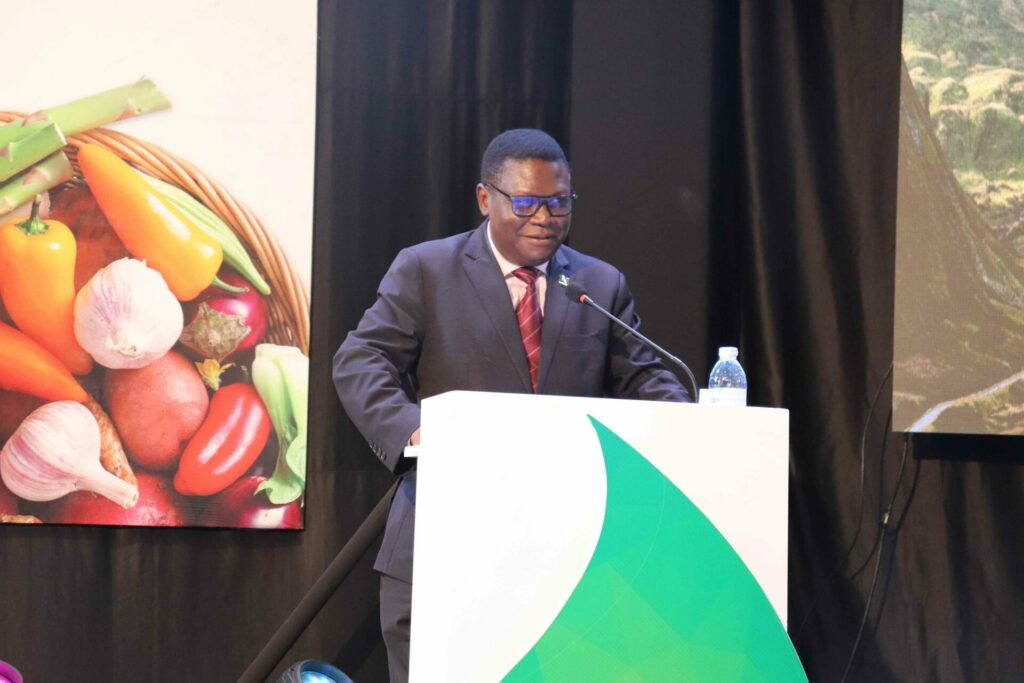
On the 18th and 19th of April 2023, Food Rights Alliance co-organized the second annual national conference on the right to adequate food in Uganda. In partnership with Uganda human rights commission, the Norwegian embassy, Makerere University, Kyambogo University, the World food program, the Food and agriculture organization, and many civil societies and government bodies, the conference was convened at Makerere University in Kampala with the theme “Entrenching the human right to adequate food in Uganda’s food system transformation agenda”. The main objectives of the conference were to assess progress achieved in the 20 years since the first national conference which was held in 2003, look out for the opportunities and challenges encountered during the previous years, and finally draw a road map for the coming two decades.
The conference was physically and virtually attended by over 300 participants from academia, government bodies, civil societies, and well-wishers. The event was officially opened by the state minister of agriculture Hon. Bwino Kyakulaga and closed by the minister in charge of human rights Hon. Nobert Mao and the Norwegian ambassador in Uganda. Information at the conference was delivered in form of speeches, presentations, panel discussions, and question-and-answer sessions to keep the conference lively while achieving the set targets. Topics presented and discussed included;
Food for health and well-being; it was noted by Ms Agnes Kirabo (FRA ED) that life begins and ends with food. In the year 2022, over 2000 people in Karamoja died due to hunger and lack of food. It also came out vibrantly that in Uganda 55% of households are vulnerable to multi-dimensional poverty with 39% of households working to provide for food needs in their homes. This means that there is a very big portion of people that are seated hunger gate. It was quoted that food is health care and medicine is sick care.
Food production and consumption in Uganda. It was noted that Uganda produces enough food that can feed all its population although due to climate change and population growth that is 3% higher than the food production increase, there is a likelihood that food shortage will occur. In the country, 72% of agriculture relies on rain which makes food production constant if not reduced due to climate change and other factors.
Food security for national security. The Doctor Peter Milton Rukundo quoted that ‘It is from the hungry that dictators are born’. Afande Karikona (UPDF representative) denoted that people have surrendered personal responsibilities to the government, therefore, putting a huge burden on it. Ms. Agnes Kirabo (Executive Director FRA) quoted “The rich cannot speak when the poor are hungry”. This means that for the haves and halve nots, there should be equal rights to food for mutual and peaceful living.
Food safety; 1 in 10 people suffer from food-borne illnesses each day, the rising cases of food safety are questionable with over 200 diseases being spread from food and over 420000 people anticipated to die per year due to food poisoning. As quoted by Professor Kaaya Achileo “If it is not safe, it is not food”. Food value chains should be strengthened to provide safe foods all the time. This is evidenced by the increasing cases of non-communicable diseases such as cancer that are on the rise in the country. These have on many cases been suspected to result from the aflatoxins in food.
Elaborating on the importance of the inclusive right to food, the conference highlighted that the fight for this agenda is every person’s duty and requires personal responsibility, multi-dimensional action from all sectors like health, environment, agriculture, and human right. As the FRA ED quoted “We shall continue to rallying and holding the government accountable, not running in front of it”, there is a need to increase civic spaces that advocate for the inclusive right to adequate food if we are the achieve the targets set for the coming 20 years.
By Margaret Nabukenya
Programs Assiatant- Food and Nutrition Security
